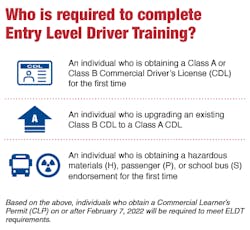New driver training regulations on Monday, Feb. 7, will cement a federal standard to obtain a commercial driver’s license. The new rules, which look to tighten how truck driving schools teach and train new drivers, have been in the works for nearly seven years.
The revised Entry-Level Driver Training regulations won’t affect current CDL holders—unless they seek to upgrade or obtain different commercial driving levels. The rules are aimed at drivers obtaining their first CDL; upgrading their CDL from a Class B to Class A; or obtaining a new hazmat, passenger, or school bus endorsement.
See also: What carriers need to know about FMCSA’s driver apprenticeship program
First mandated by Congress in 2012, the Entry-Level Driver Training Advisory Committee created the regulations through a negotiated rulemaking process in 2015. This standardized ELDT regulation was needed within the trucking industry, according to David Heller, Truckload Carriers Association VP of governmental affairs.
“The rule itself sought to standardize the training of entry-level drivers, regardless of age, so that these potential CDL holders would be trained to a model that demonstrates each driver is able to safely operate a commercial motor vehicle,” Heller told FleetOwner.
After being delayed for years, CDL schools must be teaching to the same proficiency standard by Feb. 7. Driving training schools also must register with the Federal Motor Carrier Safety Administration. Students trained by unregistered schools would not be eligible to take the CDL skills and knowledge tests.
American Trucking Associations estimates that 85% of entry-level drivers already are trained with the curricula that meet the new ELDT regulations. Despite some “false rumors spreading on social media,” Dan Horvath, ATA’s VP of safety policy, said the CDL process is not changing much.
Unless a carrier conducts in-house CDL training, the new rule also does not put the onus on fleets to verify a driver completed training under the new EDTL regulations. “Carriers are not required to verify a driver’s completion of training or to keep a record of entry-level training in a driver’s DQ file,” according to Jen Loomis of J.J. Keller & Associates, which offers safety and regulatory compliance solutions. “As long as a driver holds a valid CDL, carriers can assume that the driver has completed all required training.”
Once the ELDT system is in place, the FMCSA Training Provider Registry will file records of CDL applicants who completed the new training and certification processes. Any applicant who obtained a new CDL or commercial learner’s permit before Feb. 7 will not be subject to ELDT requirements, with some exceptions.
About the Author
Josh Fisher
Editor-in-Chief
Editor-in-Chief Josh Fisher has been with FleetOwner since 2017. He covers everything from modern fleet management to operational efficiency, artificial intelligence, autonomous trucking, alternative fuels and powertrains, regulations, and emerging transportation technology. Based in Maryland, he writes the Lane Shift Ahead column about the changing North American transportation landscape.



